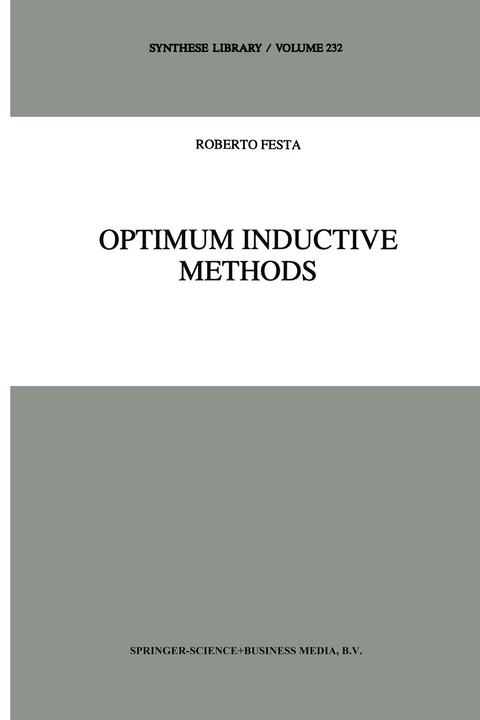
Optimum Inductive Methods
Springer (Verlag)
978-0-7923-2460-7 (ISBN)
This book deals with a basic problem arising within the Bayesian approach 1 to scientific methodology, namely the choice of prior probabilities. The problem will be considered with special reference to some inference methods used within Bayesian statistics (BS) and the so-called theory of inductive 2 probabilities (T/P). In this study an important role will be played by the assumption - defended by Sir Karl Popper and the supporters of the current verisimilitude theory (VT) - that the cognitive goal of science is the achievement of a high degree of truthlikeness or verisimilitude. A more detailed outline of the issues and objectives of the book is given in Section 1. In Section 2 the historical background of the Bayesian approach and the verisimilitude theory is briefly illustrated. In Section 3, the methods used in TIP and BS for making multinomial inference~ are considered and some conceptual relationships between TIP and BS are pointed out. In Section 4 the main lines of a new approach to the problem of the choice of prior probabilities are illustrated. Lastly, in Section 5 >the structure of the book is described and a first explanation of some technical terms is provided.
1. Introduction.- 2. The Theory of Inductive Probabilities: Basic Features and Applications.- 3. Bayesian Statistics and Multinomial Inferences: Basic Features.- 4. Bayesian Point Estimation, Verisimilitude, and Immodesty.- 5. Exchangeable Inductive Methods, Bayesian Statistics, and Convergence towards the Truth.- 6. GC-Systems and Dirichlet Distributions.- 7. The Choice of Prior Probabilities: The Subjective, Aprioristic, and Contextual Approaches.- 8. The Epistemic Problem of Optimality (EPO): A Contextual Approach.- 9. The Contextual Approach to EPO: Comparisons with Other Views.- 10. Disordered Universes: Diversity Measures in Statistics and the Empirical Sciences.- 11. Concluding Remarks.- Notes.- References.- Index of Names.- Index of Subjects.- List of requirements and acronyms.
| Reihe/Serie | Synthese Library ; 232 |
|---|---|
| Zusatzinfo | XIV, 194 p. |
| Verlagsort | Dordrecht |
| Sprache | englisch |
| Maße | 155 x 235 mm |
| Themenwelt | Geisteswissenschaften ► Philosophie ► Allgemeines / Lexika |
| Geisteswissenschaften ► Philosophie ► Logik | |
| ISBN-10 | 0-7923-2460-9 / 0792324609 |
| ISBN-13 | 978-0-7923-2460-7 / 9780792324607 |
| Zustand | Neuware |
| Informationen gemäß Produktsicherheitsverordnung (GPSR) | |
| Haben Sie eine Frage zum Produkt? |
aus dem Bereich


